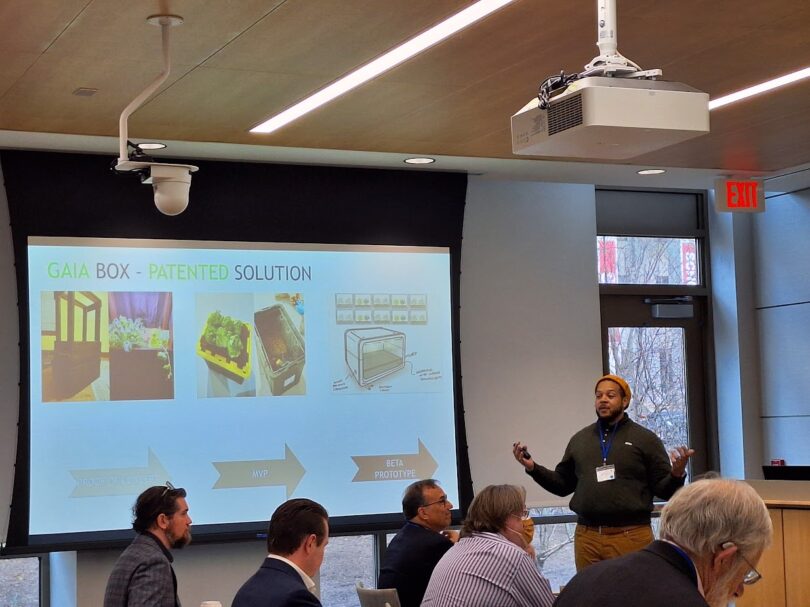Ahead of a three-day water startup matching event, organized by WaterCitizen.Org and hosted by DC Water on 19 February, Dr Robert Bornhofen, director of innovation at DC Water, shares his views on the challenges faced by the US utility and how they are being addressed.

Dr Robert Bornhofen, director of innovation at DC Water
DC Water provides drinking water and wastewater services to 700,000 DC residents and wastewater services to another 1.8 million people in the US states of Maryland and Virginia. What are the utility’s main challenges?
There are three key challenges facing DC Water that come to mind. One is aging infrastructure such as old and leaky pipes and valves in need of repair and/or replacement.
Another is the transformation toward digital technologies that lead to smarter systems. This involves sensor technology and the application of artificial intelligence (AI) and large language models. No doubt, this is a challenging undertaking that requires deliberate thought, smart investment, and change management.
The third area involves the location of DC Water in serving our nation’s capital. We have just one source of water for public consumption – the Potomac River. Strategy is currently underway to create another sustainable source of potable water should this one source be compromised.
What options are being considered?
As a highly innovative utility, DC Water is formulating various options as we speak. We are guided by a five-year strategic plan called Blueprint 2.0, which lays out five strategic imperatives from which our innovation strategy aligns as our guiding compass.
As for a more sustainable water source, as noted, several ideas are under consideration, such as using effluent from treated wastewater as a new source of potable water to augment the traditional sources of rivers, lakes and aquifers.
Other sources of renewable energy are being pursued. For instance, DC Water is investing in solar panels to generate renewable energy.
We are also looking to further leverage district energy as a renewable energy source. This involves tapping underground sewer pipes where temperature differences exist with above-ground temperatures.
This temperature differential allows us to create cool air in the summer and warm air in the winter months. The outcome keeps buildings comfortable while reducing the need for grid electricity powered by fossil fuel.
Leak detection is yet another area of interest. We are looking at solutions that involve such technologies as fiber optics and artificial intelligence (AI), including machine-learning, to help pinpoint water leaks.
Experimentation is also underway with AI-enabled chatbots in a couple of areas within DC Water for added efficiency savings.
How would you compare innovation strategy development and execution for DC Water, compared with private corporations?
The comparison in industries is very different. Unlike other industries, the water utility sector holds a huge public responsibility for providing clean water, sewer collection, and wastewater treatment – in full compliance with federal, state, and local regulations. It is a life-giving industry that often goes unnoticed, but is always on, serving the public 24 hours a day, 7 days a week, 365 days a year.
Given their essential role, where mishaps can potentially lead to serious consequences, water utilities tend to be risk averse to change, more than I experienced in other industries. Take generative AI, for example, initially, there was some resistance when it was first promoted at DC Water. However, this apprehension has since been reconciled through greater awareness of AI and associated controls.
The mindset shared among leadership and staff is one of the biggest differences I’ve experienced when comparing the water utility sector to other industries. In my opinion, utilities tend to be overly patient and complacent toward acting on problems known to exist.
By comparison, many of the for-profit companies I know, where ‘time is money’, act with greater agility in addressing pressing matters.
At DC Water, innovation is being advanced in several ways. Our Chief Executive and General Manager David Gadis is a strategic leader who has made innovation a priority. His vision for an enterprise-wide approach to innovation based on best practices, framework models, tools, and defined roles is making a positive impact.
The WaterPitch! Water Startup Matching Extravaganza is being held at DC Water’s headquarters on 18-20 February 2025. Why are events like this important for utilities and municipalities?
Innovation is about diversity of thought, skills and opinion. I believe that the water sector needs new perspectives, fresh ideas, and an ecosystem of smart partners. Events like WaterPitch! make this possible.
Soon, WaterCitizen will host its 3rd Annual WaterPitch! event at DC Water’s headquarters. This is where innovators scout new technologies and capabilities.
I participated in last year’s event and was impressed by the many opportunities shared for startups and supporters of water entrepreneurship. WaterPitch! is where we network, learn from one another, and generate fresh ideas. It is an excellent venue for addressing water challenges in all sectors, considering all solutions, and all stages of startups.
At last year’s WaterPitch, I witnessed one of the Best Pitch Award winners deliver their presentation – Alberto Lopez from Sunfish.AI. In fact, we brought Sunfish to DC Water afterwords for discussions on potential use of his technology, and recommended Alberto’s pitch be included in a Technical Advisory Group meeting with utility leaders, investors, and startups throughout the northeastern US.
Through WaterPitch! I was able to meet various Startup Founders and understand how their innovations support the water industry with new capabilities and modern technology for added impact.
At this year’s WaterPitch, DC Water’s Vice President of Water Operations, Chris Collier, will present a reverse pitch on a challenge. He will engage a roomful of local and regional businesses in discussion, hoping to hear of capabilities and ideas that can potentially solve this challenge.
I am impressed how WaterCitizen founder and chief executive Dr Cat Shrier and her team work to bring together the different people and organizations involved in water entrepreneurship – including entrepreneurs, investors, funding agencies, innovation-focused clients and entrepreneur support programs – into a cohesive community.
The WaterPitch! Water Startup Matching Extravaganza takes place 18-20 February at DC Water’s HQO Waterside Events Center in Washington DC. To register, visit WaterPitch.Org
The event is organized by WaterCitizen.Org and includes pitches from up to 60 water startups and reverse pitches by up to 50 potential investors, funders, clients and accelerators. There are also opportunities for liaison with Members of Congress, federal agencies, trade representatives, and other policymakers.







